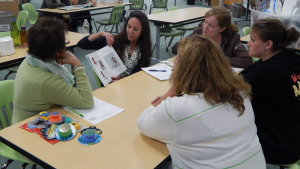Friday, August 21st, 2020
For Immediate Release
K-2 Educators Learn How to Teach Literacy Connections
Using Hands-On Science Remotely with the
Wade Institute for Science Education
Quincy, MA/Online – During 3 days in July, a group of Massachusetts and California K-2 teachers came together for a remote Summer Professional Development Institute designed to equip them with skills and tools to foster deep science learning in the early elementary grades. Integrating Inquiry and Literacy in the Elementary Science Classroom allowed educators to shift their practice to teach grade-level specific content by integrating science and literacy learning. The institute was one of 4 held by the Wade Institute for Science Education, a Quincy-based not-for-profit organization whose goal is to spark a love of science in students by providing high-quality STEM professional development for K-12 teachers.

Teachers can make connections between science and literacy through the use of materials like children’s books.
From July 28th – 30th, teachers worked both virtually and remotely with their fellow participants, taking part in small group sessions via Zoom to complete inquiry science investigations aimed at developing science and literacy skills. Teachers examined how reading, writing and talk can foster science learning. They explored how engaging students with books, science journals, talk circles and informational text can be used to further students’ understanding of science topics and reinforce learning. For example, they observed the basic structure of an organism, recorded their observations in a science notebook, and then shared their findings with their peers to communicate science. Educators also examined the physical properties of water as a way to explore the levels of inquiry that can be used to engage students’ curiosity and inspire them to take an interest in science. During group sessions and virtual chats, participants practiced using productive talk and explored teaching methods that support critical thinking and meaning making.
Teachers explored on-site and remote resources available from museums, science centers, and libraries to utilize throughout the school year. To supplement their efforts the Wade Institute mailed custom toolkits of materials for inquiry-based activities to each participant, for use both during the course and later with their students. When partner sites reopen to the public, teachers will also be invited to participate in optional in-person field sessions to enhance what they learned during the course.
Said one teacher, “My biggest insight today was probably that quality [professional development] with knowledgeable and responsive facilitators, engaged and invested peers, and relevant content and readings is such a powerful thing to be a part of. Today was both humbling and revitalizing.”
This unique professional learning opportunity connected teachers to a support network that they can continue to turn to during the school year, including instructors Jeff Winokur and Karen Worth (Education Consultants ), Maria Rundle (Executive Director, Flying Cloud Institute), Sandra Ryack-Bell (Executive Director, Wade Institute for Science Education), and Kathy Renfrew (Education Consultant, Wade Institute for Science Education).
Participants earned Professional Development Points (PDPs) for their work during the course and had the option to receive 2 graduate credits from Framingham State University or Cambridge College.
Integrating Inquiry and Literacy in the Elementary Science Classroom will return this Fall as an Academic Year Professional Development Institute.
About the Wade Institute for Science Education
The Wade Institute for Science Education is a 501 (c)(3) Massachusetts-based nonprofit dedicated to hands-on, minds-on, inquiry-based science education. We connect classroom teachers and informal educators with science, technology and engineering content expertise, inquiry-based instructional methods, regional STEM resources, and peer learning communities. We help educators discover first hand the value of inquiry-based learning, and master innovative ways to spark students’ curiosity for STEM. For more information, visit www.wadeinstitutema.org or call 617-328-1515.
###
